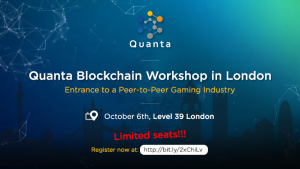On the 20th of September, 2017, the Blokchain Live event was held at The Brewery in London. Over the course of one day, hundreds of attendees had the opportunity to listen to talks given by a wide variety of speakers on the subject of blockchain technology, with topics ranging from gaming and governance to regulation and climate change. The event catered to different blockchain knowledge levels, with talks specifically designed to give those who were new to the scene information on areas such as smart contracts and ICOs.
Whilst there was an assortment of presentations, they were grouped into five general themes, running in five different rooms throughout the day. The centre stage looked at such ideas as developing distributed ledger technology, the future of blockchain, regulation, and the sectors that blockchain is poised to disrupt – investigating the state and future of blockchain technology. The Govchain room, however, was concerned primarily with the use of blockchain technology by governments of various countries or applications such as education, employment and healthcare. Examining use cases and the applications of distributed ledger technology was the purview of the Enterprise Application stage, where industries such as insurance and processes such as supply chains were discussed. The two final areas were Inside Tech, where listeners hard about the latest technology and software developments, and Blockchain 1.0 where business leaders less familiar with the technology could be brought up to speed.
A large number of speakers and attendees, coupled with the information and viewpoints that were being exchanged, represented the increasing interest that blockchain technology is currently. A number of talks were packed, with standing room only, whilst some of the Blockchain 1.0 presentations in particular were full to capacity with people still waiting to attend – possibly showing that many businesses are only now realising the need to implement blockchain solutions and attempting to catch up with early adopters. With over forty presentations in the five areas, attending everything was not possible; however, there were a number of topics that drew a lot of interest, particularly at the Govchain stage.
Early on in the day, the potential use of blockchain in the games industry was highlighted by Volodymyr Panchenko, Founder and CEO of DMarket.io, who spoke of the work that DMarket is doing to add value to the gaming industry – worth an estimated $100 billion in 2016 and growing rapidly – by implementing a decentralised marketplace to trade virtual items between players and across games. Panchenko noted the ability of blockchain to facilitate worldwide trade at improved levels of efficiency and to verify authenticity and scarcity of items. His belief in the benefits it offers leads him to believe that, in the next 10 years, blockchain technology will be more prevalent than not.
At the Govchain discussions, lessons and developments in other countries such as Greece, Sweeden and Estonia were examined. Eva Kaili, MEP, spoke of the potential of blockchain to remove the geographical borders in the EU and the benefits of a permanent and immutable record both for voting mechanisms and deterring illicit activity, but also the issues of people still not trusting the technology and the regulatory uncertainty. Kaili described the huge hidden cost in the EU which blockchain could slash, reducing allocative operational, cost and time inefficiencies. To this end, the EU is looking to become a hub for blockchain, possibly creating a sandbox for innovation and development, and will be releasing the results of a study early in 2018.
Kaspar Korjus, Managing Director of e-Residency for the Republic of Estonia, explained the Estonian e-Residency system where people worldwide have the ability to join a global, online nation. This can give e-residents the ability to start and run businesses from places in the world in which they wouldn’t have the opportunity to otherwise. Users own their data which is stored on the blockchain and access to it is monitored by the user. Korjus remarked that services beyond running a business were potentially on the cards but some ideas, such as creating its own cryptocurrency, were very much ideas only and that although there were huge benefits to using blockchain in government, there were still many aspects to investigate.
Mapping reality, setting boundaries and tracking ownership was the aim of the Lantmӓteriet – the Swedish National Land Survey – which Anna Eriksson, the CIO and Director of Development, described its experimentation with blockchain technology. Starting a couple of years ago, the project was a proof of concept for the property transfer process in the digital world which proved a success. Following this, testbed was built and worked and the next stage is now in progress. The next phase is concerned with the kind of blockchain to use, who will operate and maintain it, security and legal issues. The benefits of faster transactions, increased transparency, better security and other benefits were all found to come through implementing a blockchain solution.
Other talks covered applications of blockchain including: where it is being used by Interpol to gather information about criminal and track them thanks to the transparency of blockchain technology; the potential of blockchain to be used in education to prevent the fraudulent qualifications being claimed or giving flexibility and control to students in education; and solving many issues in healthcare, including huge inefficiencies.
Rounding off the day, one of the final panels focussed on some of the less common applications of blockchain technology – charity and climate change. Cécile Baird, Founding Partner of Blockchain for Good, chaired a panel which discussed the use of distributed ledgers for social good. One of the key benefits that was described was the ability to ensure that charities are genuine and that donations are distributed to where they are needed as unfortunately not all charitable endeavours are legitimate. Besides this, the global nature and disintermediation that blockchain brings was stated to allow much more efficient distribution than can currently be experienced, as sometimes donations have to go through multiple companies and banks, losing money in the process. Various possible solutions for both charity and climate change were envisioned but Annamarie Poorterman, Start Fund Project Manager at Start Network, noted that there were multiple proof of concepts being looked at over the next few months, thanks in part to a partnership with the help of a donation from the Estonian government. The panel was an excellent reminder of the humanitarian possibilities provided by blockchain technology, alongside it’s finance and trade benefits.
Throughout the day, there were numerous opportunities to learn about the power of blockchain technology and discover the uses can be, and in some case is being, put to use. The general message that attendees took from the event was that the time to begin using blockchain technology is now, and those that hesitate will miss out or fall behind as the rest of the world adopts it. Legacy systems and fears of decentralisation should not be allowed to hold back development: blockchain is too valuable to ignore.













